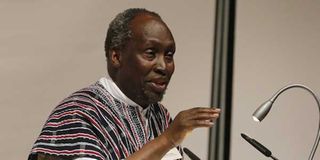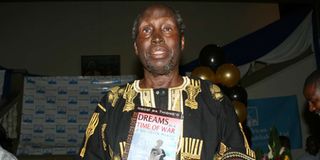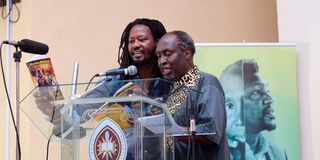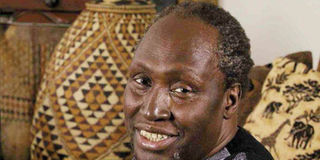Premium
Ruto leads Kenya in mourning Ngũgĩ wa Thiong'o, one of Africa’s greatest writers of all time

The late Ngugi wa Thiong'o
President William Ruto on Thursday led the nation in mourning literary giant Prof Ngũgĩ wa Thiong'o, celebrated by many as one of Africa’s greatest writers of all time, who passed away on Wednesday at the age of 87.
Describing him as a beloved teacher, writer, playwright, and public intellectual, President Ruto said Prof wa Thiong’o had “made an indelible impact on how we think about our independence, social justice as well as the uses and abuses of political and economic power.”
“In his bold and creative career, Prof Thiong'o showed us how to make contributions that cannot be ignored and speak in ways that both supporters and opponents cannot ignore. His patriotism is undeniable, and even those who disagree with him will admit that Prof Thiong'o's discourse always sprang forth from a deep and earnest quest for truth and understanding, devoid of malice, hatred or contempt,” President Ruto said.
Also read: Ngugi wa Thiong’o: Life and Times
He revisited the subject of the Nobel Prize for Literature, which scholars and literature lovers agreed, many times, that he deserved, but never once got it.

Prof Ngugi wa Thiong'o holds a copy of his autobiography titled 'Dreams in a Time of War, after it was launched on August 19, 2010 in Nairobi.
"Many Kenyans cannot remember a time when we were not united in the hope that Prof Thiong'o would finally receive the Nobel Prize for Literature, which we all felt he more than deserved. Be that as it may, he will always remain the champion of literary emancipation and innovation in our hearts and minds," President Ruto said.
Prof. Thiong'o, whose literary works have sparked mind-bending debates, stirred controversy, shaped democracies, and inspired many, died in the United States of America, confirmed by family, of a long illness, bravely borne.
His son, Mukoma Ngugi, who is also a writer and a scholar, expressed his grief, noting that he owed much of his personal and professional identity to his father.
“I love him. I am not sure what tomorrow will bring without him here,” he said.
His daughter, Wanjikũ Ngũgĩ, described the family patriarch as a man who “lived a full life” and asked Kenyans and the global literary community to celebrate his life and work.
Deputy President Kithure Kindiki mourned the departed in "profound sadness."
"One of Kenya’s finest public intellectuals, Prof Ngugi was admired by many across the globe, and those who disagreed with his views respected him. The world’s academia is left very much the poorer without this great son of Kenya,” Prof Kindiki said.

Prof Ngugi wa Thiong’o and poet and human rights activist Ndungi Githuku at St Paul’s University in Limuru, Kiambu County on February 21, 2019.
Interior Cabinet Secretary Kipchumba Murkomen also highlighted the deceased's role in putting Kenya and Africa on the global stage through his literary works.
“Prof Ngugi wa Thiong’o, the literary and academic icon, played a pivotal role in hoisting Kenya’s and Africa’s name high on the global stage,” he stated.
He added that "through his highly innovative approach to literature, he inspired countless authors and leaders across generations, for which we are eternally grateful. His legacy also endures in the books that many generations of Kenyans studied or read for enjoyment".
The Orange Democratic Movement leader, Raila Odinga, in his brief statement, described Prof Thiong'o as a giant in the literary space, both in Africa and beyond.
“A giant African has fallen. Rest in Eternal Peace, author Prof Ngugi wa Thiong'o!” he stated.
Prime cabinet minister Musalia Mudavadi mourned the departed as one who stood tall as one of the most distinguished literary giants ever to emerge from Kenya, and indeed, East Africa.
"Through timeless works like The River Between, Petals of Blood, and A Grain of Wheat, he illuminated the soul of a nation, challenged the status quo, and gave voice to generations," Mr Mudavadi said.

Renowned author Prof Ngugi wa Thiong’o.
He added that Prof Thiong'o and his pen stirred thought, provoked dialogue, and shaped the landscape of African literature.
'Exceptional mind'
Wiper Democratic Party leader Kalonzo Musyoka eulogised the deceased as an exceptional mind, one of the finest not just in Kenya and Africa, but renowned across the world.
Democracy for Citizens Party leader Rigathi Gachagua in his tribute said the passing on of Prof Thiong’o has ”orphaned Africa; we, the students of literature, have borne it all".
He said the deceased was one in many: a mentor, a teacher, a prolific writer, a poet, an honest man, and a great political animal.
"If a literary genius ever lived who has inspired my world of literary language and communication, may it be the use of symbolism, figurative language, metaphors, metonymy, poetry, that genius is Prof. Ngùgì Wa Thiong’o,” Mr Gachagua said.
He said the African literary champion never shied from writing in his native language and his quest to tell the African story through the African lens.
"This inspiration lives on through works like Matigari, Ngahìka Ndeenda, Caitaani Mutharaba-Inì among others, true to African heroism. I have enjoyed reading his works," he said.
National Assembly Speaker Moses Wetang’ula described the late author as a mighty voice whose influence was far-reaching.
He praised Prof Thiong'o's literary works as more than mere stories, but acts of defiance that echoed the dignity and struggles of African people.
Mr Wetang’ula lauded the author’s choice to write in Gĩkũyũ language, calling it a radical act that reclaimed the prestige of African languages and resisted cultural erasure.
“He was not confined by the ordinary constraints of storytelling. He bore the soul of a continent and the cry of its people within every line he penned. His writings were not just literary artefacts, they were acts of defiance, declarations of dignity, and hymns of remembrance,” he said.
Senate Speaker Amason Kingi hailed the departed as a literary icon and a key intellectual figure whose writings explored themes of linguistic decolonisation and social justice.
He noted that his thinking on language as a tool of cultural identity would continue to influence scholarship and activism for generations.
“His death is a major loss not only to Kenyans who easily identify with his outstanding works but also to the African continent at large, where he features among the golden generation of writers who blazed the trail with their compelling works of literature,” he said.
People's Liberation Party (PLP) leader Martha Karua remembered him as a patriot and literary giant whose contribution to national consciousness is etched into the country’s soul.
Trans Nzoia Governor George Natembeya described him as a “towering giant” whose intellect and literary courage redefined African identity.
He said the writer’s commitment to decolonising the African mind had transformed literature into a tool of resistance and renewal.
Mombasa Governor Abdulswamad Nassir referred to Ngũgĩ as a cultural custodian whose works challenged colonial ideology and reclaimed the African narrative.
He noted that Ngũgĩ’s legacy would continue to shape global conversations around African identity, especially through his passionate advocacy for indigenous languages.
Prof Ngũgĩ wa Thiong’o leaves behind a vast body of work that shaped modern African literature. Among his notable novels are Weep Not, Child (1964), The River Between (1965), A Grain of Wheat (1967), and Petals of Blood (1977), each addressing the complexities of colonialism, nationalism and identity.
His more radical works, such as Devil on the Cross (1980) and Matigari (1987), were written in Gĩkuyũ, part of his commitment to challenging the dominance of colonial languages in African literature.
He also penned acclaimed memoirs including Detained: A Writer’s Prison Diary (1981), Dreams in a Time of War (2010), and Birth of a Dream Weaver (2016).
Also a playwright, essayist, and academic, with influential non-fiction works such as Decolonising the Mind (1986) and Moving the Centre (1993), which continue to guide debates on language and power.
Throughout his career, he translated many of his own works, championing African languages as carriers of culture, resistance, and self-definition.
Also read the second article in this series --> Exiled Ngugi: From Ngaahika Ndeenda troubles to an international career
Also check this out --> 5 things you should know about Ngũgĩ wa Thiong'o


